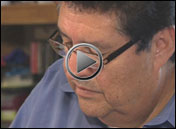Fernando Arriola spends his days keeping track of four or five construction projects, and his nights praying for good health. The New Orleans home builder is one of the 46 million people in this country who don’t have health insurance.
Four years ago Arriola, 58, bought a friend’s contracting business, just as New Orleans was starting to rebuild after Hurricane Katrina. He named it New Beginnings Enterprises.
“It was a new beginning for me; it was a new beginning for the city; it was a new beginning for a lot of people we were working with,” he says.
And business has been good. He does mostly residential work, like the quaint mother-in-law cottage in the Garden District where his crew is laying tile and putting on the finishing touches.
Making A Living, But Not Enough For Insurance
More on the Uninsured
Arriola makes about $50,000 a year and says he enjoys working for himself. But what he’s missing is the comprehensive health coverage he had at his former job as a sales manager.
Ever since he’s been self-employed, Arriola has been on a health insurance roller coaster. Initially, he bought a standard policy with a $1,000 deductible to cover his family. Then, when business slowed down and money got tight, he decided to temporarily drop the coverage. When he tried to reinstate it, he could only afford a catastrophic plan.
“I was paying $900 a month for a $5,000 deductible that would cover nothing until I hit that $5,000. So I was paying in essence $15,000 before I had one penny covered. And that was too expensive,” Arriola says.
So he dropped that coverage, only to have second thoughts. And when he tried to get it back, he was denied even the expensive catastrophic policy. Arriola doesn’t know exactly why, but he acknowledges that he and his wife both have high blood pressure and are approaching 60.
“Insurance is nothing more than just a business. And they try to limit their liabilities. So where there’s an older person, they don’t want to cover it,” he says.
Aging Without Coverage
Maria Arriola doesn’t think it’s fair that after years of paying for coverage and not having many claims, now, when they are starting to have health problems, they can’t get insurance.
“There’s nothing you can do about that. As you get older things don’t work so well, so…” she says.
The Arriolas did buy a policy for their two daughters, ages 22 and 16. But Fernando and Maria are uninsured. They pay for doctor visits and prescriptions out of pocket.
If something major comes up, Arriola says he would leave the country for medical services. Arriola is a naturalized citizen and has lived in New Orleans since 1970. But last year, he traveled to his native Guatemala for arthroscopic knee surgery. It cost him less than $1,000.
“Over here [it] would cost me thousands. They have just as good of doctors as they have over here. Most of them graduated from here,” he says.
Not Waiting For Congress To Fix
As for the debate on Capitol Hill over health care reform, Arriola takes a businessman’s approach to the issue: Open up the marketplace, he says, and create a national playing field so consumers will have more options.
But he does not have faith that Congress will come up with a fix because of partisan politics. So, in the meantime, he’s working to do something locally as a member of the board of directors for the New Orleans Faith and Health Alliance. The group is trying to start a health clinic in unused classroom space at a midcity church. Patients would pay based on their income.
“The purpose is to be able to provide the working uninsured medical services. There is definitely a need. I’m a perfect example of it,” Arriola says.
The alliance hopes to start providing care this fall. Arriola plans to sign up. In the meantime, he prays that nothing serious happens. The way the system works now, he says, he’d have to experience a major calamity to get coverage.
“I would have to go into the hospital, I would have to lose my house, I will have to lose all my savings, lose everything for the government to be able to help me. So 40 years of work, 40 years of struggle has to come to nothing. I have to be totally destitute in order for me to be able to get some help.”
Arriola says he doesn’t want anybody to give him anything. He just wants to be able to afford health insurance.
“There has to be a way,” he says.







